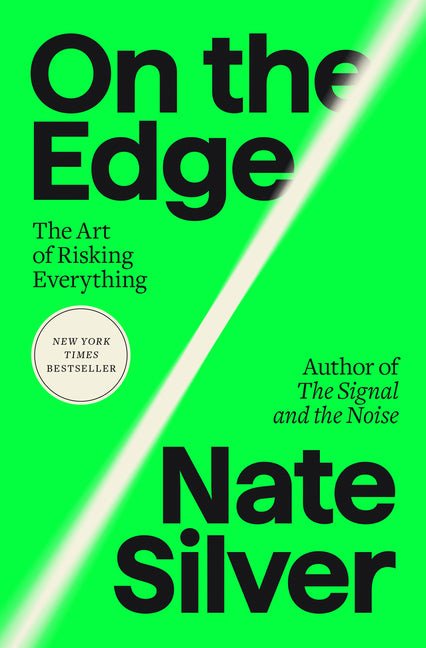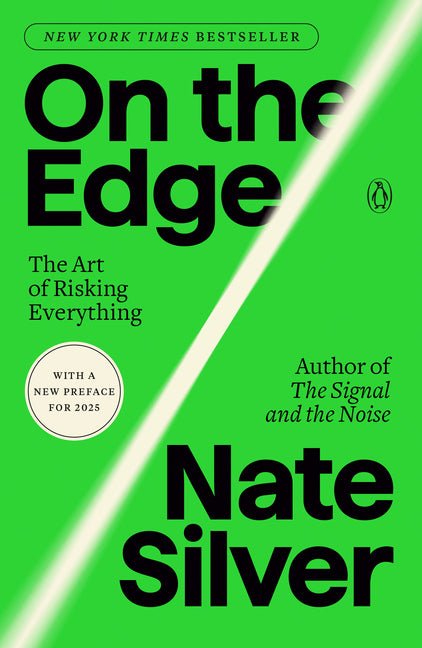On the Edge: The Art of Risking Everything
by Nate Silver
*When you open this audiobook on Libro.fm, be sure to select Aveson as your bookstore so that your purchase supports local literacy programs and tree‑planting.
Couldn't load pickup availability
The Instant New York Times Bestseller
"Engaging and entertaining... a glimpse of the economy of the future." --Tim Wu, New York Times Book Review
From the New York Times bestselling author of The Signal and the Noise, the definitive guide to our era of risk--and the players raising the stakes
In a world wired for chaos, these players are rewriting the rules. High-stakes, high-IQ, and often high on their own mythologies, they are driving the next era of ï¬nance, tech, and politics. But what happens when their bets go too far?
Nate Silver's On the Edge reveals the hidden world of the River. It is the domain of gamblers and like-minded folks who move markets and change the fabric of society: poker legends, hedge fund titans, crypto speculators, and even those willing to bet the world's future on AI. They are obsessives with a deep hunger for volatility and an unrelenting desire to exploit every edge over the rest of us. Silver embeds with them, com-peting in the World Series of Poker, visiting Sam Bankman-Fried's FTX compound, and attending wild Miami yacht parties at the height of the crypto bubble.
On the Edge is a front-row seat to a new world order built on risk, math, and ambition--a gripping ride through the minds shaping your future, whether you like it or not.
Share
Book Details
ISBN:
9781594204128
EAN:
9781594204128
Binding:
Hardcover
Pages:
576
Authors:
Nate Silver
Publisher:
Penguin Press


This is an excellent book that has been informative on a range of topics including sport betting, poker, AI, effective altruism and others.The book seems very personal, almost a midlife memoir of sorts, and the author doesn't shy away from offering his informed perspective on complex and controversial topics.
Definitely a must read for those who have concerns or thoughts of what AI can and could do. An amazingly powerful discussion of game theory; where we have been and where we are going.
Lots of great stuff. Very current. Needs better editing. Really. Some parts went on far too long others didn’t tie in well. I’m very happy to have read it!
Readers like me who loved The Signal and the Noise because it emphasized ideas rather than personalities may be slightly disappointed by Silver's new book, which tends to the opposite. The overall theme is that there is a subculture of risk-takers -- from poker to sports gambling, from finance to crypto, from Mark Zuckerberg to Elon Musk to Sam Bankman-Fried -- here somewhat obscurely called the River. This contrasts with what Silver calls the Village (Brits would say the Establishment) who are risk-averse. The book is essentially a collection of stories about such individuals and Silver's own experiences. The stories are great as stories -- enjoyable and engaging, with the goal ofunderstanding the mindset of the River.However, what I regard as "Ideas" comprise less of the book: here are some of them.(1) The discussion of conflicts and rivalries between Silicon Valley and the Village is very revealing.(2) He really shines in a discussion of utilitarianism, Effective Altruism and the Yudkovsky-Hanson style of "rationalism".These are variants of the "expected value" approach used by quantitatively-minded risk-takers. In this book most risks are financial, but there is also mention of "physical" risk-takers.(3) The section on possible catastrophic effects of AGI has a good account of comparing probabilistic predictions from Tetlock-style superforecasters and from domain experts: why are they very different? (As a not-so-super forecaster myself, the fact that short-term geopolitical forecasters get feedback from their results makes them more trustworthy).(4) There is almost no mathematics or technical statistics, though one of the key ideas is mentioned briefly. The Kelly criterion for long-term gambling/investment enables (in principle, if you know the probabilities) you to maximize long-term growth. Amongst people who take a much more aggressive approach ("5 times Kelley"), most will eventually lose money while a very few will become extremely rich -- all "by chance". So you can't tell whether someone thus successful is merely one of the lucky few.Other parts of the book strike me as reasonable but with little novelty. The analogy between poker and Wall Street has been emphasized in many books, for instance [The Poker Face of Wall Street, by Aaron Brown]. Game theory in the context of nuclear war, and general dangers of AGI, have been widely discussed. And while I am never impressed by such lists, for the record here is Silver's list of 13 habits of "successful risk takers".1 cool under pressure2 have courage3 have strategic empathy4 process oriented, not results oriented5 take shots6 take a raise-or-fold attitude to life7 are prepared8 have selectively high attention to detail9 are adaptable10 are good estimators11 try to stand out, not fit in12 are conscientiously contrarian13 are not driven by money.
I really liked how Silver pulled everything together at the end. He makes a strong case for why we need to rethink the systems we’ve relied on for almost a century—because they might not be holding up as well as we think. It’s a thought-provoking look at risk and decision-making, especially for people who like to analyze their choices rather than just go with their gut.That said, the book had its ups and downs. Silver’s writing is fine, but the whole River vs. Village metaphor felt a bit overdone. At times, it seemed like an excuse to talk (a lot) about his love of gambling. Also, the section on Sam Bankman-Fried didn’t add much—it could’ve been cut without losing anything important, and the book would’ve been stronger for it.If you like thinking about risk and decision-making in a structured way, this is worth a read. Just be ready for a few detours along the way.



